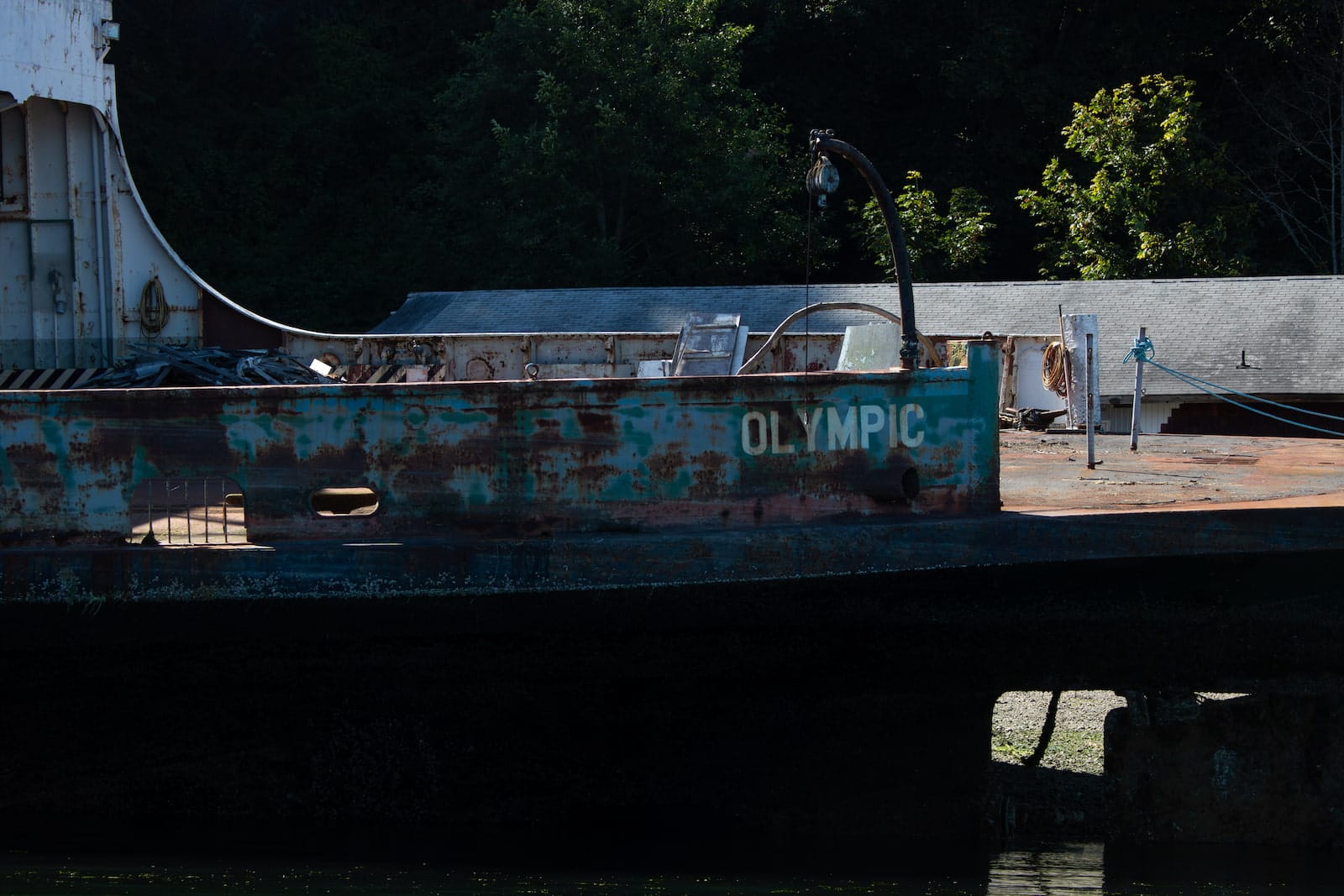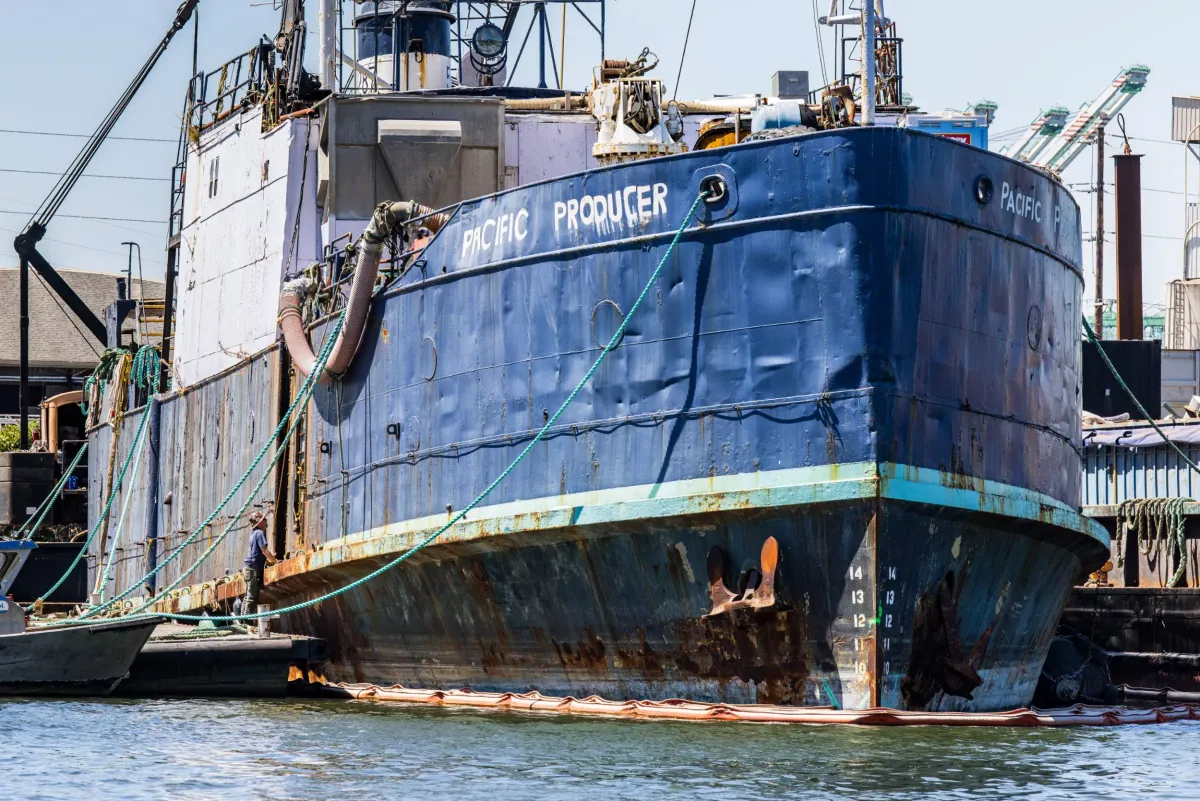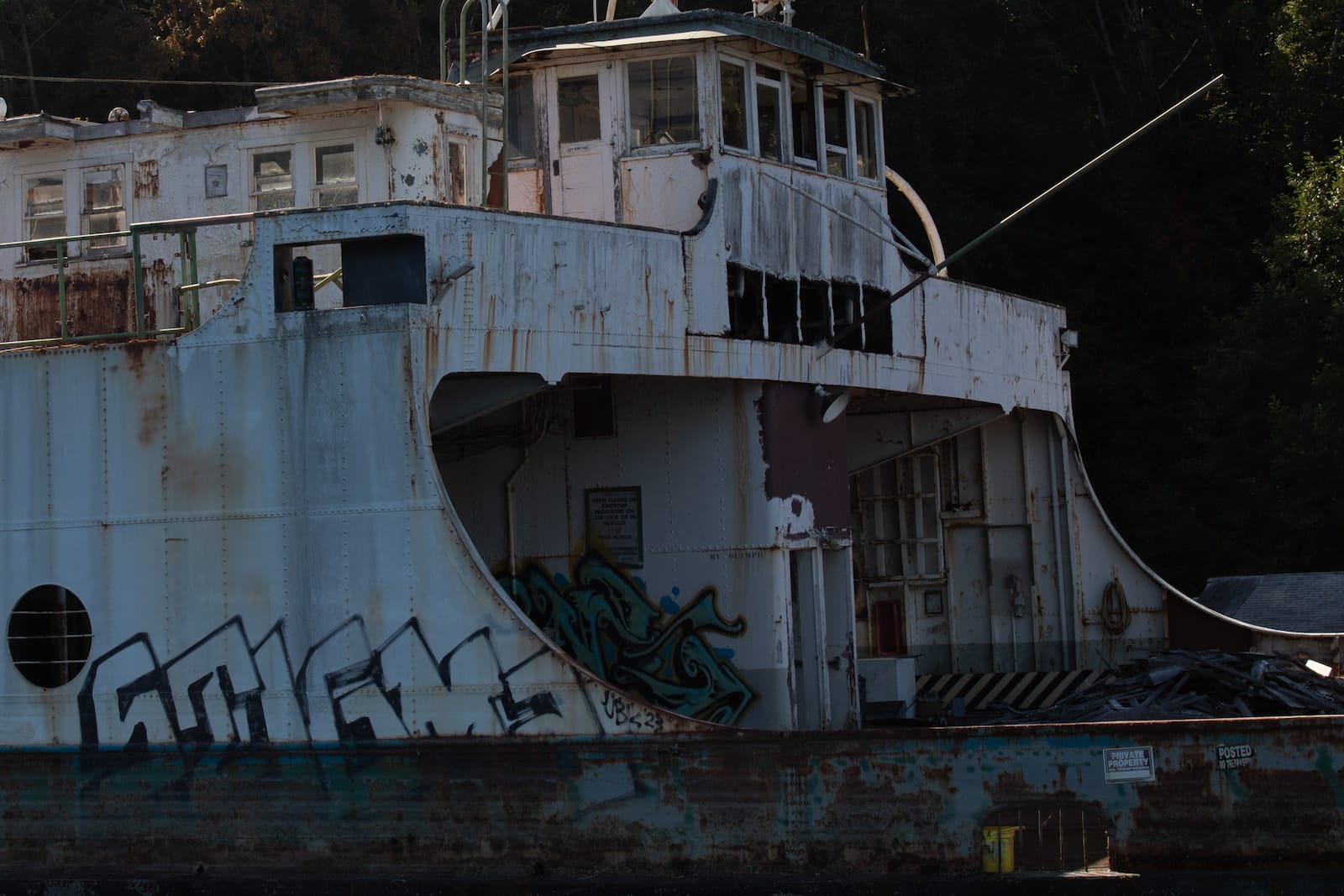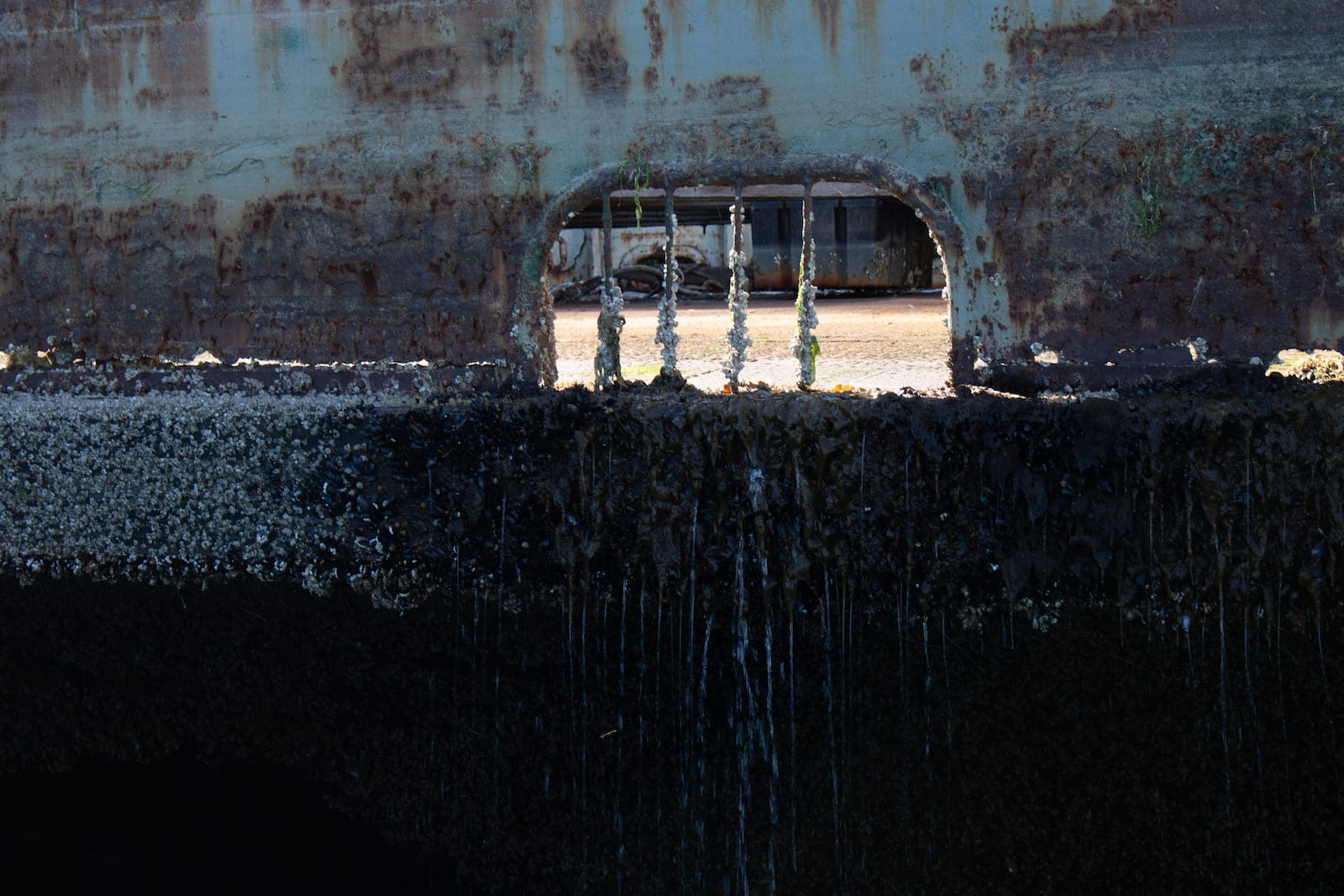These Washington educators have lost or surrendered their teaching license for alleged misconduct
A searchable teacher misconduct database compiled by InvestigateWest fills gaps in the state’s public-facing records
An abandoned ferry in the Puget Sound represents a shared struggle across the West Coast: to sell an old ship or destroy it

An abandoned former Washington state ferry, the Olympic, rests slanted on a shoreline off Ketron Island, in southern Puget Sound. Aboard, flakes of corroded steel and other debris scatter across the floors, graffiti lines the walls, and at high tide, water pours over the deck. Rust has crept over its forest green paint, the signature color of Washington State Ferries. Some 25 years ago, the Olympic sold for $71,000 at a state surplus auction. Years later, it sold again. This time, allegedly, on eBay.
The ferry has been beached for 15 years, and it’s not likely to be removed anytime soon. At 206 feet, it surpasses what Washington’s Derelict Vessel Removal Program is permitted to remove. Plus, it’s on private property making the legal custody process tedious and with no guarantees. The ship’s owner hasn’t removed the ferry although he told state officials he would.
“This one you’ll be looking at for a long time,” says Troy Wood, manager of the vessel removal program.
Earlier this year, Gov. Bob Ferguson signed a $714.5 million contract to construct three new hybrid-electric ferries by 2030. The contract made headlines over Ferguson’s controversial decision to hire a Florida shipbuilding company. But for state transportation officials, the construction of new ferries presents them with another difficult choice: What should they do with the old ones?
If all follows schedule, the state will have on hand 16 newly constructed hybrid-electric ferries in about 15 years as it moves to replace its diesel-powered fleet by 2040. Washington’s efforts to eliminate the largest source of carbon emissions among state agencies calls into question whether the old ferries will go on to pollute marine waterways in Washington or elsewhere.
Selling them in a public auction risks future abandonment that could harm the marine biome. Transporting them to another facility without prior and proper cleanup could violate the Toxic Substances Control Act, an Environmental Protection Agency-enforced law. Sending them to a shipbreaking facility in Brownsville, Texas — the nearest one — could cost nearly $1 million for transportation alone.
Washington isn’t alone in its surplus of aging ships. Older ships, constructed with now-banned materials, don't have a place on the West Coast to be dismantled sustainably and responsibly. The absence of safe disposal methods leaves owners of ships across the U.S. West Coast and British Columbia muddled in a logistical, financial and legal dilemma.
Recently, Washington has tried to sell two other retired ferries to Adelca, an Ecuadorian steel manufacturing and recycling company that paid $200,000 last year for both vessels, the Klahowya and the Hyak, decommissioned in 2017 and 2020 respectively. But that, too, has proved controversial. Hazardous waste treaties designed to protect workers in developing nations from toxic chemical exposures govern international borders.

Last fall, Adelca contracted a shipping company to transport the vessels, but when they tried, the towline broke before a ferry could be taken out of Elliot Bay. Later, allegations arose that the crew lived in poor working conditions. Adelca did not respond to a message from InvestigateWest seeking comment for this article.
State officials cited these issues as reasons to halt the ferry sale until Adelca submits a new towing plan that’s green-lighted by the Coast Guard, the U.S. Maritime Administration and other state agencies. But if another buyer can offer a bid before then, the ferries could go to them instead, said John Vezina, deputy assistant secretary of Washington State Ferries. The state does not want future ferries to end up like the Olympic.
“We don’t want them on a Washington beach, Oregon beach, California beach, Mexican beach,” Vezina said. “We need to make sure they can get to Ecuador.”
International ship recycling advocacy groups say if Washington does transport the ferries to Ecuador, it could be violating the Toxic Substances Control Act, leaving the door open for potential financial penalties, civil and even criminal liability — if proven it knowingly violated the law.
“If you use and profit from an asset for decades, the least you can do is make sure that it reaches the end of its life in a proper way without creating human and environmental costs,” said Nicola Mulinaris, senior communications and policy adviser for NGO Shipbreaking Platform, a coalition of organizations that advocate for ship recycling worldwide in hopes to end exploitative occupational practices in countries like India and Pakistan.
The Toxic Substances Control Act is triggered when ships containing concentrations of 5o parts per million or more of a now banned chemical called polychlorinated biphenyls, PCBs, are transported out of the country. These can appear in paint, electrical cabling, rubber sealing material and caulk.
The U.S. banned PCBs in 1979. Ships made before then, like the Elwha and Klahowya, are likely to contain them, according to James Aidala, former assistant administrator of the EPA's Office of Chemical Safety and Pollution Prevention and now a regulatory expert at Bergeson & Campbell law firm.

Prior to transportation, the act encourages ship owners to collect paint, surface, liquid, insulation and cable samples to determine if PCBs are present. The act mandates that PCBs onboard not exceed the 50 parts per million threshold. PCBs are classified as carcinogens by the International Agency for Research on Cancer.
Washington State Ferries contracted a third party company to test for PCBs. In testing surface and paint samples, it found the PCBs did not surpass 50 parts per million.
But one watchdog group has also expressed concern that sales to developing countries like Ecuador go against a United Nations treaty called the Basel Convention, which is designed to prohibit the transport of hazardous materials from developed to developing countries and to minimize such hazardous exposures to people and ecosystems.
Last fall, the Basel Action Network, a group that advocates for Basel Convention compliance, urged the Washington State Department of Transportation to reconsider its sale of the Elwha and Klahowya ferries to Adelca after reviewing hundreds of pages of the state’s inspection surveys for the vessels.
“It does not appear that the ex-ferries Elwha and Klahowya were sufficiently tested to determine whether they contain hazardous wastes on board or if they trigger the 50 ppm PCB export ban found in” the Toxic Substances Control Act, wrote the Action Network’s executive director Jim Puckett to Washington State Ferries in an October 2024 letter obtained by InvestigateWest.
According to the inspections, the Elwha and the Klahowya contained 1,500 and 500 gallons, respectively, of “miscellaneous lubes.” Puckett said these lubricants are considered hazardous materials under Basel.
If the transport of the ferries does occur, the Action Network says Washington could inadvertently leave Ecuador as the party to violate the Basel Convention. The United States is not a party to Basel, but Ecuador, like 190 other countries, is.
“Even if WSF was 100% confident that a ship did not contain hazardous materials that would trigger Basel, WSF still needs to be extremely careful not to send ships to a ship scrapper engaging in exploitative and dangerous labor practices,” Puckett wrote in the letter, referring to Washington State Ferries. “By design, it can be difficult to determine exactly where a ship will end up once handed off to a cash buyer, which gives sellers plausible deniability on being complicit in improper disposal of their ships.”

Adelca, the steel company, plans to dismantle the ferries and recycle the parts, according to Vezina, assistant deputy of Washington State Ferries.
The EPA’s Region 10 Office, which covers the Pacific Northwest, is unaware “whether the ferry vessels in question contain PCBs,” according to Kristin Ching, public affairs specialist.
“Owners/operators are responsible for determining whether their vessels contain regulated levels of PCBs and must remediate or remove PCB materials for disposal before export unless an exception or exemption applies,” Ching said in an email to InvestigateWest.
Since 2011, Washington’s Department of Enterprise Services has been responsible for selling the state’s surplus items. It’s tried selling Washington state ferries before, but no bid was high enough to meet the market value that the state wanted, according to a transfer of authority request letter obtained by InvestigateWest.
For at least the last three decommissioned ferries, transportation officials received total authority from the Department of Enterprise Services to sell its own vessels, ruling out input from the state agency in deciding who will buy the state’s ferries.
“WSF’s attempt to sell seven previous auto/passenger ferries and four passenger-only ferries… have all been unsuccessful, even after re-listing vessels with lower reserves,” wrote the then-state transportation director of legal services, Timothy McGuigan, in a 2019 letter requesting authority over the sale of another ferry, the Hyak.
One ferry, he wrote, listed for $300,000, but the highest bid was only $53,000. Prior to 2013, sales were negotiated at or close to fair market value, he said.
Additionally, the Hyak was marketed as “non-operational” in its sale listing due to the removal of navigational equipment for use on other active ferries.
Transportation officials also said that based on previous ferry sales experience, the high cost of transporting it to a foreign country was a “prohibitive factor for many interested parties,” citing costs that could exceed $800,000 if a ferry was towed to the Caribbean, for example.
The process of selling Washington state ferries calls into question whether a shipbreaking facility based on the West Coast would be a solution to Washington state’s current and future needs.
“I keep thinking that a regional solution here in the Salish Sea could be good,” said Doug Helton, retired operations supervisor at the National Oceanic and Atmospheric Administration who assisted Washington and states across the country in recovering large abandoned watercraft.
Because deconstructing a vessel the size of a Washington state ferry would produce large amounts of steel, the scrap value could outweigh the cost to destroy it, Helton said. “But, scrap prices fluctuate, and the project could get upside down in a hurry even if it started with good intentions.”
"It can be difficult to determine exactly where a ship will end up once handed off to a cash buyer, which gives sellers plausible deniability on being complicit."
Commercial shipping yards contracted by state agencies to destroy abandoned vessels are sometimes hesitant to accept bids due to concerns of legal liability if an environmental disaster were to occur.
“They don’t want to tie up their facilities with a potentially lengthy and environmentally risky scrapping job,” Helton said.
Wood, manager of Washington’s Derelict Vessel Removal Program, says a closer shipbreaking facility on the West Coast would make his job much easier and would ultimately be safer for the environment. But without that, options are limited.
“I don’t condone scuttling them in deep ocean, but that would be a whole lot less harmful than putting [them] right on the tidal zone, the most aquatic diverse area we have out there. Fish use it for breeding, and birds use it. Deer use it.”
It’s questionable if even a conveniently located ship recycling facility would work. Historically, the transportation has sold retired ferries for a profit. If it chose to destroy the vessels instead, the agency would likely pay thousands for its dismantling, possibly coming out even after selling the ship’s parts.
“If there was a local shipyard, we would certainly talk with them and it would be great to have something closer than Ecuador or Texas,” said Vezina, deputy assistant secretary of Washington State Ferries.
With the high cost of West Coast real estate, securing the location for a shipbreaking facility would be difficult. Additionally, such a facility would be a large waterfront industrial use, said Sheri Pemberton, chief of external affairs for the California State Lands Commission on behalf of the agency’s vessel removal program. The facility would have to meet state, local and federal permitting requirements and be environmentally regulated.
“Best practice is to disassemble vessels out of the water, which is most protective for the environment,” Pemberton said.
For now, the Basel Action Network is still urging Washington State Ferries to end the sale of the Elwha and Klahowya to Adelca, the Ecuadorian steel company. Christopher Hudak, the group’s senior policy adviser, said rather than looking to Washington, D.C., for a solution, “a state law would be more realistic” in preventing sales to developing nations and mandating state agencies to destroy their own ships.
Passengers aboard the Steilacoom ferry to Anderson Island can see the beached Olympic ferry in the distance off Ketron Island’s eastern shoreline. It, too, once carried passengers to and from the island. Up close, mussels, barnacles and private property signs cling to its hull. Cormorants dive into nearby waters. The Washington State Department of Transportation logo is clearly visible on its chimney. At low tide, water pours out of portholes.

The owner of the Olympic owns one other ferry that he reportedly sailed from Virginia through the Panama Canal to Washington. It, too, is abandoned, docked on another island and in even worse condition than the Olympic.
“[The Olympic] is definitely worse than some of them [former government vessels],” said Wood, the manager of Washington’s derelict vessel removal program. “It was made out of steel a long time ago. It’s really hard to deconstruct. It’s really hard to decompose.
“You see the paint that’s coming off with it?” Wood said, looking at a recent image of the ferry. “That paint was meant to prevent life from attaching itself from this boat. It’s shiny. It gets eaten up by little critters in the environment, and it gets concentrated as it moves up the food chain.”
The Derelict Vessel Removal Program became aware of the Olympic in 2010 after the Coast Guard and the Department of Ecology sent photos of the ship to the Department of Natural Resources.
“This looks awful,” wrote Kristin Swenddal, now-retired manager of the aquatic resources division for the Washington State Department of Natural Resources in an internal email obtained by InvestigateWest. “It appears the entire boat is going to tip at any time.”
In the 15 years since, little has changed.
“It’s obviously damaging the environment,” Wood said. “My job is to remove those vessels from the environment. I can’t touch this vessel, which is unfortunate.”
Wood said to remove the vessel, the state Legislature would have to provide special funding and authorization since the vessel surpasses the 200-foot threshold of what the program is legally allowed to remove. But even then, Wood said, he would have to go through a lengthy bureaucratic process to gain custody of it and get permission from the property owner to go on-site.
“It’s very frustrating,” he said.
Correction: An earlier version of this story misidentified one of the two Washington state ferries purchased by Adelca. It was the Hyak, not the Elwha.
The story you just read is only possible because readers like you support our mission to uncover truths that matter. If you value this reporting, help us continue producing high-impact investigations that drive real-world change. Your donation today ensures we can keep asking tough questions and bringing critical issues to light. Join us — because fearless, independent journalism depends on you!
— Jacob H. Fries, executive director
DonateCancel anytime.
Subscribe to our weekly newsletters and never miss an investigation.